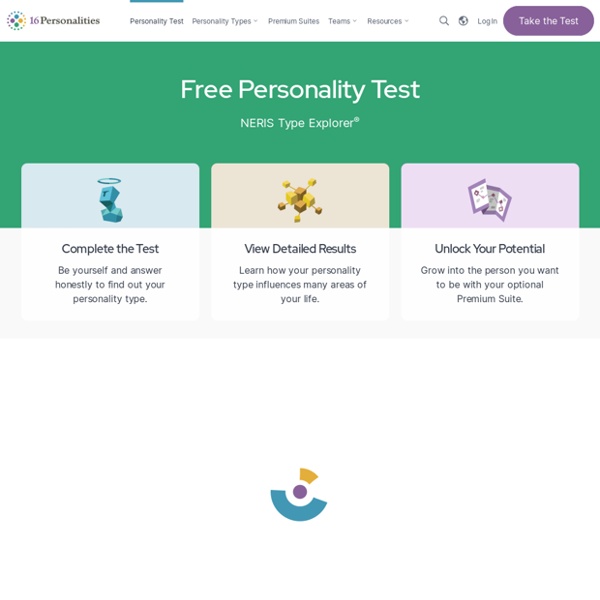by Dr. Isabelle A. Moser with Steve Solomon
This book was written to help educate the general public about the virtues of natural medicine and to encourage the next generation of natural healers. This book is not copyright; it is public domain material. Reproduction and dissemination is encouraged as long as the entire book is kept intact and remains unaltered. Steve Solomon, June, 1997. Forward
The Myers & Briggs Foundation - Take the MBTI® Instrument
People who are certified to administer the MBTI instrument are committed to using it in an ethical way, which includes protecting your confidentiality, showing you how to verify your type, giving feedback interactively, and presenting all types as valuable. Where to take the MBTI® personality assessment instrument Consultants, counselors, coaches, therapists and many other people with interests in or training with psychology, human development, or social interaction may be certified to administer the MBTI instrument. These trained professionals will help you verify your MBTI type and discuss your results either individually or in a group setting.
Introduction to Mentoring Programme
SET has developed an Introduction to Mentoring programme for its members in conjunction with Proversity, to provide an introduction to mentoring to enable you to develop practical skills to support you in your role as a mentor. This video-based e-learning programme comprises four modules aimed at SET members with an optional final module aimed specifically at QTLS supporters. It provides approximately 12 hours of e-learning content and activities, some of which will be offline. The programme aims to develop knowledge in relation to mentoring and to provide an introduction to mentoring skills, such as active listening, giving feedback and effective questioning.
Lamictal Uses, Dosage & Side Effects - Drugs.com
Generic Name: lamotrigine (la MOE tri jeen)Brand Names: LaMICtal, LaMICtal ODT, LaMICtal XR What is Lamictal? Lamictal (lamotrigine) is an anti-epileptic medication, also called an anticonvulsant.
E-Mentoring
Online mentoring, often referred to as electronic or e-mentoring, has grown in popularity as advances in social media and online communication over the last 20 years have given both young people and youth-serving organizations increasing ability to move the work of mentors into the virtual world. Online mentoring is frequently offered to isolated groups of youth as a way of offsetting their distance from potential mentors. It is also increasingly used in traditional mentoring programs to supplement and augment face-to-face interactions (iMentor is a good example of a program that takes this blended approach). Most e-mentoring is delivered asynchronously, that is with some delay between the exchange of messages between mentor and mentee, as would be found in most email, message board, chat, or text functions using computers or mobile devices. What does the research say about E-Mentoring?
The Ultimate Guide to Becoming Your Best Self
“We are what we repeatedly do. Excellence, then, is not an act, but a habit.” Aristotle is credited with saying these 15 famous words. And for most of my life…I didn’t believe him. I fought against cultivating good habits and routines because I didn’t want to feel like I had to live my life by other people’s rules. I wanted to be my own person and do my own thing.
Studies Show I'm Worse Than I Thought
Illustrations by Joel Benjamin I thought I was only moderately depressed. Then I took four different online depression tests—Psychology Today, Mental Health America, Psych Central, and Depression.org—and they all said "severe depression." They were like "seek help." I was like, bitches I already have more help than a toddler.
Readings
Skip to main content You are currently using guest access (Login) Page path
The Strange Persistence of First Languages - Nautlius - Pocket
The Strange Persistence of First Languages by Julie Sedivy, nautil.us November 5, 2015Several years ago, my father died as he had done most things throughout his life: without preparation and without consulting anyone. He simply went to bed one night, yielded his brain to a monstrous blood clot, and was found the next morning lying amidst the sheets like his own stone monument.It was hard for me not to take my father’s abrupt exit as a rebuke. For years, he’d been begging me to visit him in the Czech Republic, where I’d been born and where he’d gone back to live in 1992. Each year, I delayed. I was in that part of my life when the marriage-grad-school-children-career-divorce current was sweeping me along with breath-sucking force, and a leisurely trip to the fatherland seemed as plausible as pausing the flow of time.Now my dad was shrugging at me from beyond— “You see, you’ve run out of time.”His death underscored another loss, albeit a far more subtle one: that of my native tongue.
Aphasia-Apps - National Aphasia Association
Assistive technologies can be helpful for persons with Aphasia, caregivers, and speech pathologists working with aphasia clients. Apps (short for ‘applications’) and assistive devices are listed below based on their usefulness for people with aphasia. This list of apps is not an endorsement of any specific application or therapy. To learn more about each app, click on the title link (app’s name shown in blue), which will take you to the app’s official website. Constant Therapy
Metacognition and self-regulation
Metacognition and self-regulation approaches aim to help pupils think about their own learning more explicitly, often by teaching them specific strategies for planning, monitoring and evaluating their learning. Interventions are usually designed to give pupils a repertoire of strategies to choose from and the skills to select the most suitable strategy for a given learning task. Self-regulated learning can be broken into three essential components:



